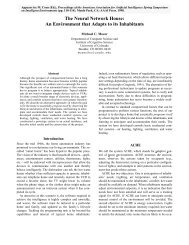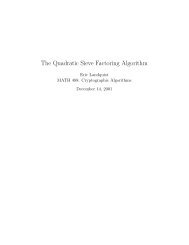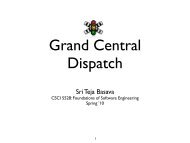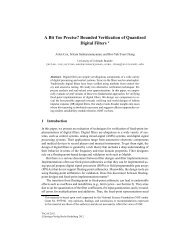Java @Annotations - Computer Science
Java @Annotations - Computer Science
Java @Annotations - Computer Science
Create successful ePaper yourself
Turn your PDF publications into a flip-book with our unique Google optimized e-Paper software.
<strong>Java</strong> <strong>@Annotations</strong><br />
Matt Beldyk<br />
CSCI 5448 - Object Oriented<br />
Design and Analysis<br />
Spring 2011
About Me<br />
• Ma*hew Beldyk<br />
• <strong>Computer</strong> <strong>Science</strong> Masters Student<br />
• Bachelors at Ohio University<br />
• Systems Engineer at UNAVCO Inc.<br />
– Many projects at most levels of the stack<br />
– From backporGng processors into older GCC<br />
– To creaGng distributed webservice systems<br />
– To chasing race condiGons<br />
– To wriGng generally various code wherever needed
The Plan of Attack<br />
• Describe Annotations<br />
• Describe the built in default annotations<br />
• Show how to make and use your own annotations<br />
• Show some real world annotation examples<br />
• ???<br />
• Profit!
What are Annotations?<br />
They allow you to annotate classes and methods in <strong>Java</strong>!
Holy cyclic definition, Batman!<br />
• Introduced in <strong>Java</strong> 5<br />
• JSR #175: http://www.jcp.org/en/jsr/detail?id=175<br />
• Allow developers to introduce metadata about functions and<br />
classes in code<br />
• Better than just a comment<br />
• 3 introduced by default by the JDK<br />
o @Deprecated<br />
o @SuppressWarnings<br />
o @Override<br />
• You can write your own too
@Deprecated: The warning of disappearing<br />
functionality<br />
// Someone is going to use this without reading the comment<br />
// Dear Developer, don't use this anymore<br />
void orderNCubedSort(){}<br />
// Use this function and the compiler will warn you at compile<br />
time<br />
@Deprecated<br />
void bubbleBobbleSort(){}<br />
@Deprecated is used to tell the developer that a function<br />
shouldn't be used anymore. It generally means that in a later<br />
version of the code, that function will go away. When a<br />
developer does use this function, the compiler will warn the<br />
developer about this.
@SuppressWarnings: No really, I know<br />
what I'm doing!<br />
Object a = new Foo();<br />
//The compiler will warn<br />
//you<br />
Foo b = (Foo)a;<br />
//Yay, no messages<br />
//about this from javac<br />
@SuppressWarnings<br />
Foo c = (Foo)c;<br />
@SuppressWarnings tells<br />
the compiler that even<br />
though it might be inclined<br />
to warn the developer about<br />
what they are doing in the<br />
next line, it really is ok and<br />
the developer knows about<br />
the issue<br />
Use @SuppressWarnings<br />
sparingly! Often javac really<br />
does know what is best and<br />
is warning you for a reason!
@Override: The class extender's friend<br />
public class Foo extends Bar{<br />
//BUG: Compiler doesn't<br />
know<br />
public String tooString(){<br />
// do stuff<br />
}<br />
//BUG: Won't compile!<br />
@Override<br />
public String tuString(){<br />
//do other stuff<br />
}<br />
}<br />
@Override tells the compiler<br />
that you intend to have a<br />
function override the parent's<br />
version of it. If there is a typo,<br />
the compiler knows there's a<br />
problem and will throw an<br />
error.<br />
@Override also tells the<br />
developer that this code is<br />
overriding a parent's version.<br />
Easier to read than a nonexistent<br />
comment to the same<br />
effect
But these just appear to be new keywords?<br />
Nay, dear student. In fact, annotations are much more powerful<br />
and you can create your own!
There are two kinds of annotaGons<br />
• Regular AnnotaGons<br />
Are applied to regular java<br />
classes, methods,<br />
statements.<br />
• Meta AnnotaGons<br />
Are applied to annotaGon<br />
definiGons to describe the<br />
behavior of the<br />
annotaGon being declared<br />
and how it can be used.
Let's Create our own Annotation<br />
public @interface myAnnotation{}<br />
Thats all there is to it! Now you can annotate your code with<br />
myAnnotation:<br />
@myAnnotation public void doCoolAnnotatedThings(){<br />
//TODO put code here<br />
}
Whoohoo, but that's not very compelling.<br />
An annotation with additional metadata:<br />
public @interface SwordMan{<br />
String nickname();<br />
String sword();<br />
}<br />
and to use it:<br />
@SwordMan(nickname="Elf Stone", sword="Arundil")<br />
Traveler strider = new Ranger();
A word on Meta AnnotaGons<br />
@Documented @interface appearsIn<strong>Java</strong>doc();<br />
This allows the annotaGon to be noted in the<br />
javadoc that’s eventually created.<br />
@Inherited @interface appearsInChildren();<br />
When a class or method is annotated with<br />
@Inherited, children of that class will also have<br />
this annotaGon (otherwise they won’t)
Meta AnnotaGons: RetenGon Policies<br />
§ RetenGonPolicy.SOURCE AnnotaGons only appear in<br />
source files (for when their only use is in compiled code)<br />
§ RetenGonPolicy.CLASS The annotaGon is compiled into<br />
the .class file, but code can’t use reflecGon to use it.<br />
§ RetenGonPolicy.RUNTIME The annotaGon can be read at<br />
runGme via reflecGon<br />
§ The default is RetenGonPolicy.CLASS<br />
§ Example:<br />
@Retention(RetentionPolicy.RUNTIME)<br />
public @interface iCanBeReadWithReflection{}
Meta AnnotaGons: @Target<br />
• This marks an annotaGon with limitaGons on<br />
how it can be used.<br />
• @Target takes a list of ElementType enums to<br />
say how it can be used<br />
• ElementType.ANNOTATION_TYPE,<br />
CONSTRUCTOR, FIELD, LOCAL_VARIABLE,<br />
METHOD, PACKAGE, PARAMETER, and TYPE.
Well, that's cool, but I already know how to<br />
use comments...<br />
Annotations can be used in three ways:<br />
• Assisting visual inspection of code<br />
• Custom annotation parsing source tools (such as javadoc)<br />
• Via reflection
I do like mirrors! Tell me more about<br />
reflection.<br />
Here's an example from <strong>Java</strong>Beat: http://www.javabeat.net/<br />
articles/30-annotations-in-java-50-1.html<br />
First we need to set up our annotations:<br />
@Retention(RetentionPolicy.RUNTIME)<br />
public @interface Author{<br />
String name() default "unknown";<br />
}<br />
@Retention(RetentionPolicy.RUNTIME)<br />
public @interface Version{<br />
double number();<br />
}
Now we need to apply those annotations to<br />
something.<br />
@Author(name = "Johny")<br />
@Version(number = 1.0)<br />
public class AnnotatedClass<br />
{<br />
@Author(name = "Author1")<br />
@Version(number = 2.0f)<br />
public void annotatedMethod1()<br />
{<br />
}<br />
@Author(name = "Author2")<br />
@Version(number = 4.0)<br />
public void annotatedMethod2()<br />
{<br />
}<br />
} http://www.javabeat.net/articles/30-annotations-in-java-50-1.html
Time to setup that class.<br />
package reflections;<br />
import java.lang.annotation.Annotation;<br />
import java.lang.reflect.AnnotatedElement;<br />
import java.lang.reflect.Method;<br />
public class AnnotationReader<br />
{<br />
public static void main(String args[]) throws Exception<br />
{<br />
Class classObject = AnnotatedClass.class;<br />
readAnnotation(classObject);<br />
Method method1 = classObject.getMethod("annotatedMethod1",new Class[]{});<br />
readAnnotation(method1);<br />
Method method2 = classObject.getMethod("annotatedMethod2", new Class[]{});<br />
readAnnotation(method2);<br />
}<br />
http://www.javabeat.net/articles/30-annotations-in-java-50-1.html
And use those annotations:<br />
static void readAnnotation(AnnotatedElement element) {<br />
}<br />
System.out.println("\nFinding annotations on " +<br />
element.getClass().getName());<br />
Annotation[] classAnnotations = element.getAnnotations();<br />
for(Annotation annotation : classAnnotations) {<br />
if (annotation instanceof Author) {<br />
Author author = (Author)annotation;<br />
System.out.println("Author name:" + author.name());<br />
}<br />
else if (annotation instanceof Version) {<br />
Version version = (Version)annotation;<br />
System.out.println("Version number:" + version.number());<br />
}<br />
}<br />
http://www.javabeat.net/articles/30-annotations-in-java-50-1.html
And we get the output<br />
Finding annotations on java.lang.Class<br />
Version number:1.0<br />
Author name:Johny<br />
Finding annotations on java.lang.reflect.Method<br />
Author name:Author1<br />
Version number:2.0<br />
Finding annotations on java.lang.reflect.Method<br />
Author name:Author2<br />
Version number:4.0<br />
http://www.javabeat.net/articles/30-annotations-in-java-50-1.html
Neat! Can we do things other than just track<br />
authors and version numbers?<br />
Junit uses annotations to tell what are test cases and how to<br />
run code:<br />
@Before<br />
public void setUp() throws Exception {<br />
qry = new MetaQuery();<br />
}<br />
@After<br />
public void tearDown() throws Exception {<br />
qry = null;<br />
}<br />
// long description of old bug I really don't want to see ever again<br />
@Test public void nullPointerExceptionWhenQueryNullThenHitTimeline()<br />
throws java.sql.SQLException{<br />
// THE TEST CASE<br />
}
What about all that old hibernate code<br />
where we have more xml than code?<br />
@Entity<br />
class MedicalHistory implements Serializable {<br />
@Id @OneToOne<br />
@JoinColumn(name = "person_id")<br />
Person patient;<br />
}<br />
@Entity<br />
public class Person implements Serializable {<br />
@Id @GeneratedValue Integer id;<br />
}<br />
See http://docs.jboss.org/hibernate/annotations
Annotation Limitations<br />
• Only do anything is there is code to specifically use them<br />
• Doesn't work in older versions of <strong>Java</strong> (before 1.5)<br />
• Too much of a good thing makes code impossible to grok
Questions?<br />
More information available<br />
The book "Effective <strong>Java</strong>" http://www.amazon.com/Effective-<br />
<strong>Java</strong>-2nd-Joshua-Bloch/dp/0321356683<br />
The Hibernate official documentation: http://www.hibernate.org/<br />
docs










